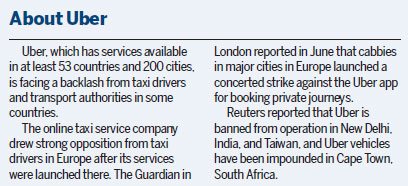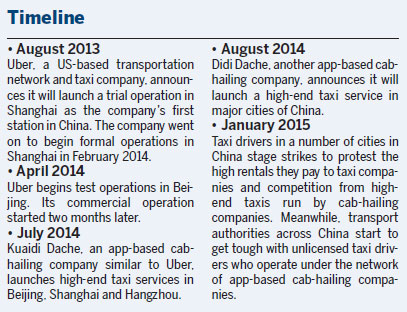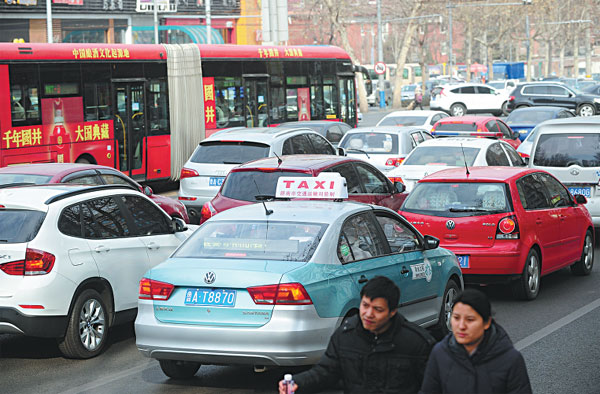Strikes put focus on driver services
By Zhang Yi (China Daily) Updated: 2015-01-16 07:12|
A lack of taxis on the road in Jinan, Shandong province, is apparent on Tuesday due to a strike by local taxi drivers protesting high franchise fees and competition from private cars using car-hailing apps. Luo Bo / for China Daily |
Convenient apps
"The apps are very handy for me. I have been hiring private cars using Didi Zhuanche and Yidao Yongche apps for more than half a year," said Zhang Lei, a 34-year-old journalist in Beijing. "I have suffered enough waiting in the bitterly cold wind for a taxi for half an hour."
She said hailing a taxi in Beijing is inconvenient. "I often finish work late. When I come out from my office around 10 pm, it can take me more than half an hour to find a taxi.
"A private car is much easier to hire through apps. Drivers nearby my office can easily find me and additional services such as WiFi, mineral water and tissue paper are available in the private cars."
Zhang said she believes that the apps, as well as "black cabs" - drivers operating private cars as unlicensed taxis - have become popular because services monopolized by a limited number of taxi companies have failed to meet the demand of the expanding urban population in megacities such as Beijing.
According to a recent survey by Xinhua News Agency, 75 percent of almost 200 respondents believe the market monopoly is the major cause of the taxi industry's tension and poor services, such as long wait periods or being refused rides.
Due to these unsatisfactory experiences, 77 percent of respondents said it is highly necessary to break that monopoly. Meanwhile, they are looking forward to new services enabled by mobile Internet technology. Among the respondents, 25 percent said they regularly use ride-call apps. Another 21 percent said they use such services occasionally.
Lawmakers in Liaoning discussed the abolition of taxi rental fees at the province's top legislator's meeting on Wednesday and reviewed a draft of a reform of taxi franchises.
The franchises for running taxis are owned by governments. Common practice in the industry is for companies to purchase taxi licenses from the government and then sell the right of running taxis to drivers and rent cars to them.
In Shanghai, each license costs 500,000 yuan for a 50-year franchise. In Shenzhen, 350,000 yuan is required for a 14-year franchise.
Wang Zhujun, a deputy head of the Commission of Transport in Jiangsu, said the pricing mechanism for taxi rental fees is complicated. The price is negotiated between taxi companies and drivers and written into their contracts after being approved by the local government.
"According to regulations, the city's pricing authority has the final say in the rental fees. We will talk with pricing and treasury departments to make the pricing process more transparent to the public," he said.
In 2013, the average monthly income of taxi drivers in Shanghai was 6,655 yuan, and the average monthly income for each taxi for a company was 8,025 yuan. A hearing on increasing taxi fares was held in Shanghai on Thursday to increase the income of drivers.
Regulations debated
Liang Jianwei, a deputy director of the Beijing Commission of Transport, said the authority is deliberating laws to regulate the taxi business. He said taxi services provided by private drivers are strictly prohibited.
Liang said the authority will continue to try to curb the rampant use of apps to hire private cars, but the use of taxi-hailing apps to hire legally registered taxis is encouraged.
"To put it simply, black cab services are illegal no matter how the drivers solicit passengers," he said.
The Beijing Commission of Transport sent 10 inspection teams last week to popular destinations including Beijing Capital International Airport to catch cars providing taxi services without a license. The airport team detected four to five illegal cabs each day.
The Shanghai government detained 12 private drivers using taxi-hailing apps via Didi Dache, and fined each driver 20,000 yuan in December. At the same time, Uber's office in Chongqing was investigated by police regarding the issue of unlicensed drivers.
"I have no objection to the fact that the car-calling industry should be regulated, but it is hard for me to be supportive of a complete ban on private car services," said Zhang, the Beijing journalist.
She said the authorities need to address the imbalance between the huge demand for car services and the limited number of taxis in major cities, while exerting a tough policy on apps, especially in an environment in which the majority of residents are deprived of the right to purchase cars in Beijing, Shanghai, Guangzhou and Tianjin.
zhang_yi@chinadaily.com.cn



- Govt encourages people to work 4.5 days a week
- Action to be taken as HIV cases among students rise
- Debate grows over reproductive rights
- Country's first bishop ordained in 3 years
- China builds Tibetan Buddhism academy in Chengdu
- Authorities require reporting of HIV infections at schools
- Typhoon Soudelor kills 14 in East China
- Police crack down on overseas gambling site
- Debate over death penalty for child traffickers goes on
- Beijing to tighten mail security for war anniversary








